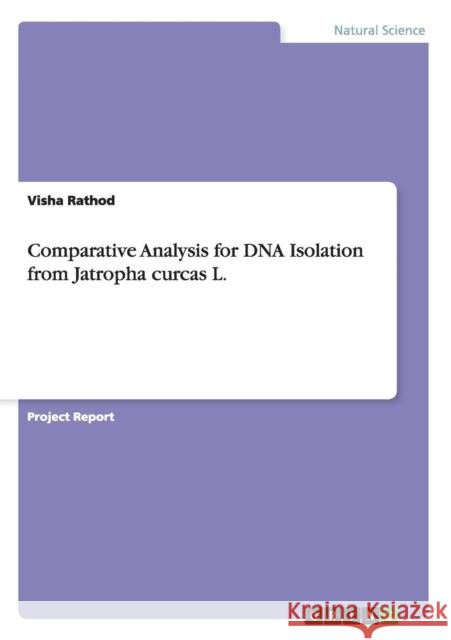Comparative Analysis for DNA Isolation from Jatropha curcas L. » książka
Comparative Analysis for DNA Isolation from Jatropha curcas L.
ISBN-13: 9783656470342 / Angielski / Miękka / 2013 / 32 str.
Project Report from the year 2010 in the subject Biology - Micro- and Molecular Biology, Saurashtra University, course: B.Sc. (Biotechnology), language: English, abstract: Abstract: Jatropha curcas will be a vast source of biofuel and a key to reducing our dependence on fossil fuels. Various government agencies around the world have proposed production of biodiesel as a renewable alternative to fossil fuel. Jatropha curcas is frequently mentioned as the best option for producing biodiesel. Despite of having potential as an alternative fossil fuel, J. curcas is not being fully exploited. Hence, there is a need to identify high yielding clones of J. curcas for its further improvement. Molecular marker analysis in genome studies enhance the speed and efficiency of crop improvement, for that we need the protocols of DNA isolation; which is used to obtain high quality and quantity of DNA. Here the objective is to carry out comparative analysis of nine different DNA isolation protocols, from those only six methods were able to isolate DNA from such secondary metabolite producing plant, J. curcas. The most effective method of DNA isolation is modified CTAB method. The extracted DNA from the leaves of Jatropha curcas had 83% purity. The extracted DNA was found suitable for restriction digestion and for different DNA fingerprinting techniques like, RAPD; which helps for the further improvement of plant. The apparent decreasing availability of fossil fuels and the notable increase in greenhouse gases in the atmosphere has lead to the global warming and climate change. Due to these beneficial aspects of Jatropha curcas, here we have preferred to carry out this comparative analysis. Keywords: Jatropha curcas; DNA isolation; CTAB; Biodiesel; RAPD











